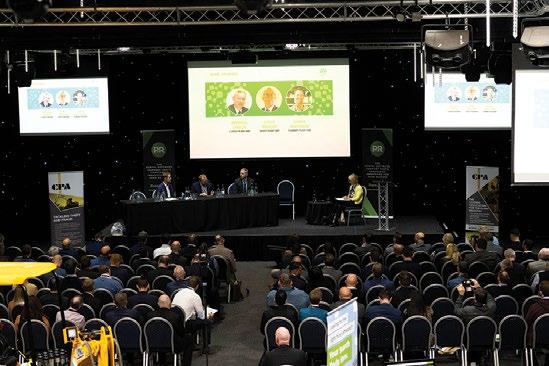
4 minute read
CPA Conference 2021 - Going Green, Going Digital
CPA Conference 2021 - Going Green, Going Digital
There were two reasons for the strong interest in October’s CPA Conference, held in Coventry. Delegates were delighted to attend a live, face to face event, and secondly, the subject matter could hardly have been more topical – with round table discussions on achieving Net Zero Carbon, along with digitalisation and its benefits.

CPA policy manager Chris Cassley said: “The pandemic is testament to the ability of hire companies to evolve and change, sometimes overnight. Covid has also shown how vulnerable we are to events beyond our control, this is particularly true with climate change, where we can all need to make a difference.” David Emery from the Supply Chain Sustainability School, which helps companies to upskill their workforce, pointed out that companies have historically been reluctant to share ideas or to take risks. All too often the focus is on obtaining the lowest rental rates. He believes such attitudes are finally changing as more companies realise the need for improvements to achieve net zero. New methods can also be more efficient, providing faster results with less remedial work and improved use of materials, and resources. Several speakers pointed out that solutions, such as electric powered equipment are already available, but highlighted the need to move away from focusing purely on price and instead towards quality, performance and environmental benefits. Chris Matthew of Flannery Plant Hire, said: “We are neither manufacturers nor inventors, but we can enable customers to use equipment more effectively. For us to achieve net zero, our customers also have to want to do so, and that has to be part of the overall strategy.” A long term view is also required, speakers warned that the transitional use of HVO (hydrotreated vegetable oil) diesel risks creating an over reliance on it, which result in further deforestation to grow the vegetation for it. Merrill Lynch of Lynch Plant, said: “A highways contractor client wanted to reduce fuel usage on site and improve sustainability. The first approach was to look at user habits. Operators were found to keep machines idling unnecessarily - to look busy - or to keep warm on cold days because the nearest welfare unit is too far away. So, by adding more facilities and training drivers in correct usage, savings were duly achieved.” Steve Bradby of Select, added: “Telematics are helping analyse how and where machines were being used, while ensuring that planned service schedules were adhered to. However, it is vital to have good key performance indicators and information dashboards in place to interpret the wealth of data meaningfully.” Flannery’s Matthew pointed out that some operators and managers may be nervous about having their performance analysed in this way. However, the efficiency gains can lead to less equipment being required for a given job. Lynch highlighted a road construction study undertaken by Caterpillar into equipment with GPS machine control systems for a specific project. “The job was done 46 percent quicker, with 34 percent less equipment and 37 percent less fuel consumed,” he said. It was recognised that early adopters of new technology face costs and challenges. But Select’s Bradby pointed out that an increasing number of contractors are now insisting on electric powered machines where practical. However, he also recalled how Select’s efforts to reduce carbon emissions on site cabins received a blank response from suppliers of items ranging from flooring material to insulation when asked about their embedded carbon characteristics. In brief opening remarks ahead of the afternoon sessions, CPA president Brian Jones noted how, in many ways, rental industry attitudes have changed little in the previous 50 years. Customers were still likely to switch supplier for a small rate reduction and rental companies find it hard to raise rates. However, he suggested there was a change in one area, namely collaboration and the sharing of ideas. He had observed that the word ‘collaboration’ had been mentioned no fewer than 35 times during the morning sessions. Ryan Pike of Trackunit said: “Major projects like HS2 have driven the adoption of new approaches. They have a mandate to set new standards, which could lead to changes in procurement. Customers will become more interested in the benefits that particular pieces of equipment can offer and in ways of managing them efficiently.” Closing the Conference, CPA chief executive Kevin Minton reiterated the importance of collaboration saying: “The association will ensure that the industry can continue to work together to address the challenges of achieving net carbon zero, with working groups for wider discussions. We will also appoint a technical officer to work full time on net zero carbon. This theme will be embedded in CPA activities for the foreseeable future.”














